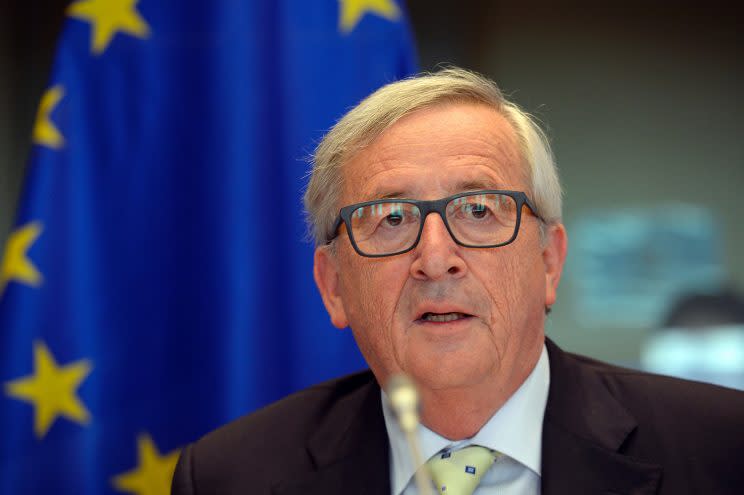European Commission head says Trump doesn’t understand how Paris Agreement works
European Commission President Jean-Claude Juncker said President Trump doesn’t seem to understand that he can’t immediately yank the United States out of the Paris Agreement on climate change.
“That’s not how it works. The Americans can’t just leave the climate protection agreement,” Juncker said Wednesday, according to a translation from NBC News. “Mr. Trump believes that because he doesn’t get close enough to the dossiers to fully understand them.”
Reports circulated Wednesday that Trump had decided to withdraw from the international pact — which has been signed by every country in the world except Nicaragua and Syria — but as of late afternoon there was no formal announcement.
Juncker, the former prime minister of Luxembourg, has been leading the European Commission, the civil service of the European Union’s executive branch in Brussels, since November 2014.
During a student conference on Europe’s future, he explained that the United States would have to wait three to four years after the agreement took effect in November 2016 before leaving.

Juncker and European Council President Donald Tusk represented the European Union at last week’s Group of Seven (G7) summit in Taormina, a small town in Sicily. They met with leaders from the seven democracies with the world’s most developed economies: Canada, France, Germany, Italy, Japan, the United Kingdom and the United States.
Amid talk of combating terrorism and the global economy, they also discussed international efforts to fight climate change. These conversations come at a particularly fraught time because Trump, who does not share his predecessor Barack Obama’s commitment to clean energy, has been reviewing the United States’ environmental policies.
According to a translation from NBC News, Juncker said that they attempted to explain to Trump that he could not simply pull the U.S. out of the Paris Agreement because the treaty contains safeguards to prevent exactly that.
“So this notion, ‘I am Trump, I am American, America first and I’m going to get out of it’ — that won’t happen,” he continued. “We tried to explain that to Mr. Trump in Taormina in clear German sentences. It seems our attempt failed.”
He said that “the law is the law” and it must be obeyed regardless of what Trump thinks, adding somewhat sardonically that not everything in international agreements is fake news.

On Wednesday morning, Axios published a report citing two sources with “direct knowledge of the decision” that Trump was planning to withdraw the United States from the Paris Agreement. Shortly after the news spread, Trump tweeted that he would be announcing his decision regarding the international agreement within the next few days.
Later Wednesday, during a meeting with Prime Minister Nguyen Xuan Phuc of Vietnam at the White House, Trump dodged a question about whether he still thinks that climate change is a hoax. When asked if he was “leaning in a direction” concerning Paris, Trump simply said, “I’m hearing from a lot of people both ways.”
Many scientific organizations have released statements or reports affirming that anthropogenic climate change is real and that it could have devastating effects if actions are not taken to limit carbon dioxide emissions.
The American Meteorological Society released a statement that read in part:
“It is clear from extensive scientific evidence that the dominant cause of the rapid change in climate of the past half century is human-induced increases in the amount of atmospheric greenhouse gases, including carbon dioxide (CO2), chlorofluorocarbons, methane and nitrous oxide.”
Dan Bodansky, a law professor at Arizona State University and a leading climate change expert, explained that Trump could get the U.S. out of the Paris Agreement two different ways: withdrawing from the Paris Agreement itself or leaving the United Nations Framework Convention on Climate Change (UNFCCC).
The text of Paris Agreement allows for countries to provide a year’s notice of its intent to withdraw. But this notice cannot be submitted until three years after the agreement entered into force for that country, which happened in November 2016.
“Whether the U.S. decides to pull out or not, under international law and the Paris Agreement, the withdrawal would not be effective until 2020,” Bodansky told Yahoo News.
Another option, which would get the U.S. out of the Paris Agreement in just one year, would be to leave UNFCCC, which was an agreement brokered under former President George H.W. Bush in the early ’90s. Although this would be faster, it would carry even more serious consequences.
Bodansky said that leaving the UNFCCC would automatically get the U.S. out of the Paris Agreement as well.
“If we pulled out of both then we wouldn’t be a party at all. We wouldn’t participate in meetings and we’d just be there as an observer,” he said. “Both of them would be viewed very negatively by other countries — by allies in Europe and elsewhere — but pulling out of the Framework Convention would be an even more drastic step.”
Read more from Yahoo News:
Trump goes after ‘negative press covfefe’ in botched midnight tweet
Ukraine and Russia trade Twitter barbs, including ‘Simpsons’ GIF
Duck! Treasury will hit debt limit soon unless Congress votes to raise it


